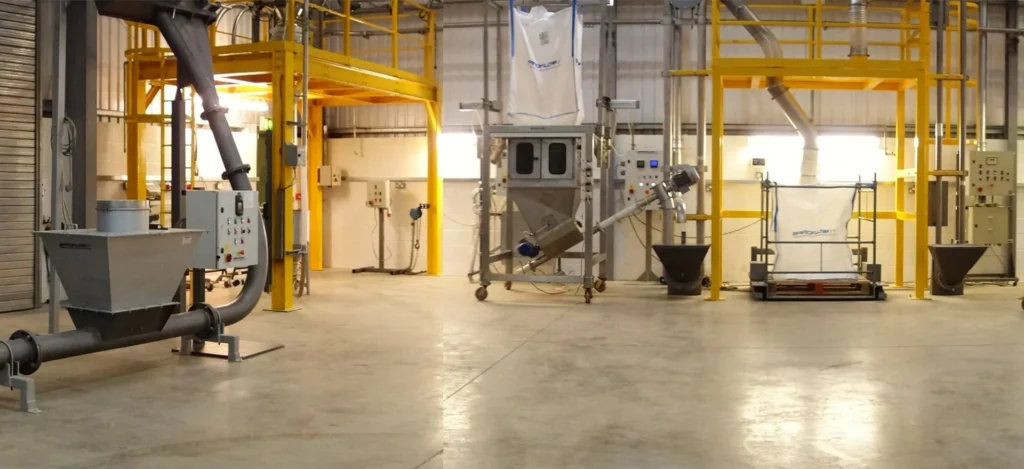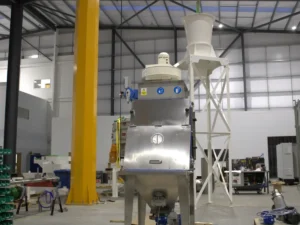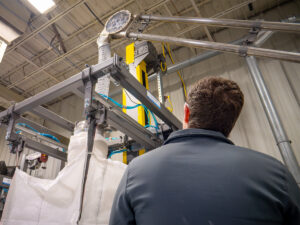Are you wondering what is bulk material handling? Perhaps you’re new to the process of manufacturing, or you’re seeking solutions for an existing production challenge. In either case, we’re here to assist. With over 45 years of experience, Spiroflow has been aiding clients with their bulk material handling requirements. We’re eager to offer some valuable insights to you.
What Is Bulk Material Handling?
The concept of “bulk material handling” primarily relates to the engineering aspect of creating mechanical equipment for the handling and processing of bulk materials. This involves dealing with various forms of materials, such as granules, flakes, bulk powders, or pellets, which are transported and supplied in diverse types of containers. Commonly used containers include bulk bags (also known as big bags, FIBCs, or super sacks), boxes (frequently referred to as octabins), and rigid bins.
Importance in Various Industries
Handling bulk materials is a crucial aspect across various industries that work with dry bulk components. This encompasses a wide range of sectors such as food and beverage production, confectionery, pet food, animal feed, tobacco, and various chemical industries, including agricultural chemicals, polymers, plastics, rubber, ceramics, cosmetics, environmental management, electronics, consumer products, mining, minerals, powdered metals, paints, pigments, coatings, paper, textiles, and recycling.
All these industries heavily rely on the use of dry bulk materials. The rationale behind this is similar to why many Americans prefer buying in bulk at stores like Costco – it’s cost-effective. A vast array of materials are purchased or sold in this manner, ranging from food ingredients and chemicals to pharmaceutical powders, as well as plastic pellets and flakes.
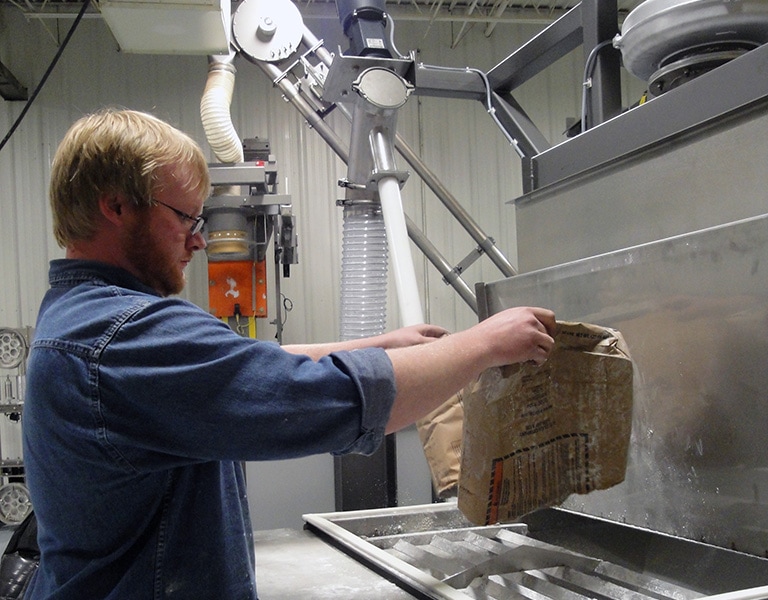
Characteristics of Your Material
Bulk materials are sourced globally from various suppliers, and it’s crucial to note that the ingredient’s flow characteristics can differ based on the supplier. For example, one supplier’s milk powder might be more compacted due to shipping or have a different fat content than that from another. Understanding the following flow properties of your materials is essential for effective handling and processing:
- Bulk density – The weight of the material per unit volume.
- Particle size – The dimensions of individual particles in the material.
- Temperature – The heat level of the material, which can affect handling.
- Material form – This can range from powders, flakes, granules, and pellets to fibers, crystals, lumps, prills, curls, or other forms.
- Flowability – Determined by the angle of repose of the material.
- Hopper characteristics – Whether the material tends to bridge or form “rat-holes.”
- Material characteristics – These can include whether the material interlocks or mats, is light and fluffy, aerates, fluidizes, packs, reacts under pressure or vibration, is heat sensitive, cohesive, abrasive, fragile, smears, is dusty, hazardous, toxic, corrosive, explosive, or flammable.
- Liquid content – The percentage of water, fat, oil, or whether the material is hygroscopic.
Understanding these properties is crucial for successfully filling, discharging, conveying, or mixing materials using bulk material handling machinery.
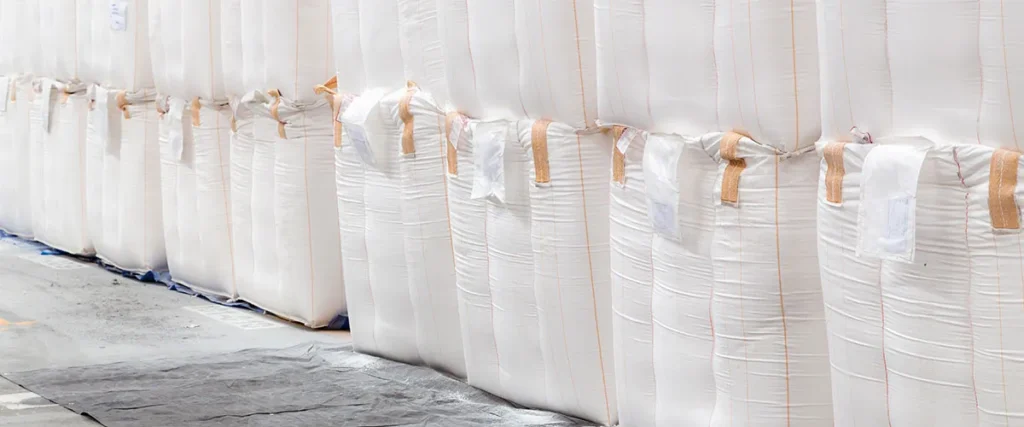
What Comes in Bulk Bags Must Come Out
Processors need to store, transport, and dispense their bulk materials at various stages of their operations. So, besides conveyor technologies, this requires mechanical equipment specifically designed for unloading materials from bulk bags, known as bulk bag dischargers or unloaders. Choosing the right discharger involves considering your specific application, the characteristics of the material, and the conditions of your site. A specialized supplier in bulk material handling can then recommend the most suitable bulk bag discharger design for your needs.
Interestingly, many clients seek bulk bag unloaders tailored for sites with limited space, such as those with low headroom. We have even engineered unloaders for unique environments like elevator mine shafts. An example is a bulk bag discharger integrated with a hoist, ideal for locations without forklift access or where forklifts are not allowed.
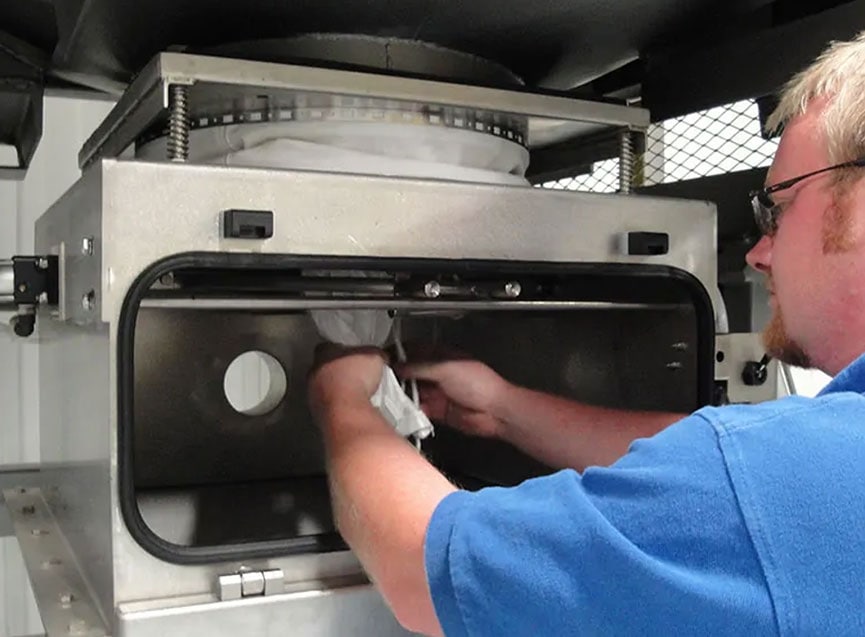
How You Move Your Bulk Material
For transporting dry bulk materials within your processing system, you’ll require either pneumatic or mechanical bulk material handling equipment. This is typically achieved using conveyor belts or feeders, like a conveyor belt system, bucket elevator, rigid or flexible screw conveyor, cable or chain drag conveyor, pneumatic conveyor, aero mechanical conveyor, or vibratory tray feeders. The appropriate conveying technology selection hinges on your specific application, the nature of the material, and the requirements of your site. An example of this would be two aero mechanical conveyor belt solutions that move material from two rigid silos to a hopper.
Supplying Your Bulk Materials in Bulk Containers
If your process involves supplying materials in bulk, you’ll require bulk-filling equipment for the final stage to efficiently fill various containers such as bulk bags, boxes or octabins, drums, or totes. This equipment is advantageous for processors because it offers versatility in filling different types of bulk containers, reduces manual handling, and ensures a safe, easy, controlled, and dust-free filling process. Additionally, filling stations can be tailored to meet specific height and access needs, as well as to accommodate potential hazardous areas in your facility.
Spiroflow’s Bulk Bag Fillers and Industrial Conveyor Systems
At Spiroflow, our bulk bag fillers are engineered to ensure a dust-free, precise weighing and filling process while also maintaining the stability and upright position of bags for secure storage and transport. Additionally, we are conveyor systems manufacturers that offer a wide range of other bulk material handling machinery. This includes bag or sack dump stations, hoppers, bin activators, storage silos, bulk bag conditioners, screeners, and control systems, among others.With a global track record of providing conveyor solutions for bulk material handling, we are well-equipped to assist with advice and support on equipment configurations tailored to your specific requirements. Feel free to contact us for any type of belt conveyor system or assistance you need!

